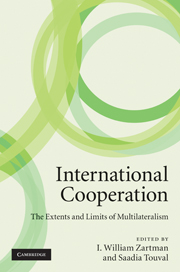Book contents
- Frontmatter
- Contents
- List of figures
- List of tables
- List of contributors
- Acknowledgements
- 1 Introduction: return to the theories of cooperation
- Part 1 Multilateral meanings of cooperation
- 2 Debating cooperation in Europe from Grotius to Adam Smith
- 3 The two sides of multilateral cooperation
- 4 Deconstructing multilateral cooperation
- 5 Negotiated cooperation and its alternatives
- Part 2 Multiple strategies of cooperation
- Bibliography
- Index
5 - Negotiated cooperation and its alternatives
Published online by Cambridge University Press: 05 June 2012
- Frontmatter
- Contents
- List of figures
- List of tables
- List of contributors
- Acknowledgements
- 1 Introduction: return to the theories of cooperation
- Part 1 Multilateral meanings of cooperation
- 2 Debating cooperation in Europe from Grotius to Adam Smith
- 3 The two sides of multilateral cooperation
- 4 Deconstructing multilateral cooperation
- 5 Negotiated cooperation and its alternatives
- Part 2 Multiple strategies of cooperation
- Bibliography
- Index
Summary
This chapter explores what happens to multilateralism when the idea is implemented. Implementation requires negotiation, because participants in a multilateral process need to agree about their joint project. Yet, despite this intimate linkage, it appears that studies of multilateralism have not given much attention to its negotiation component. Interest has been directed mainly at structures – institutions, regimes, norms, and rules – and much less at the processes of negotiation that are an integral part of multilateralism.
I use the term “multilateralism” to refer to a diplomatic strategy employed by states in order to coordinate policy among three or more actors, more succinctly termed in the introduction “a philosophy of multilateral cooperation.” It stands in contrast with “unilateralism” – a strategy of aiming to advance a state's goals alone, without coordinating with other states – and also with “bilateralism” – a strategy of coordinating with single partners, through separate arrangements with each of them. This definition is broader than Ruggie's, which defines multilateralism an “an institutional form that coordinates relations among three or more states on the basis of generalized principles of conduct” (Ruggie 1993b, p. 11). The term, as used here, encompasses the meaning given by Ruggie, but goes beyond it by including multilateral initiatives that take place outside institutions.
As used here, the term “multilateral” comprises universal frameworks like the United Nations or the World Trade Organization, as well as regional ones such as the European Union or the Organization of American States.
- Type
- Chapter
- Information
- International CooperationThe Extents and Limits of Multilateralism, pp. 78 - 92Publisher: Cambridge University PressPrint publication year: 2010
- 2
- Cited by



